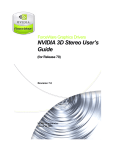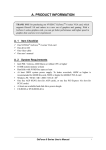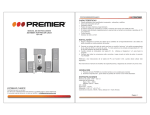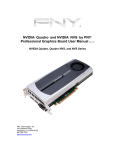Download CUDA-MEMCHECK
Transcript
CUDA-MEMCHECK
DU-05355-001_v03 | February 17, 2011
User Manual
TABLE OF CONTENTS
1 Introduction.......................................................................... 1
About cuda-memcheck .............................................................
Why cuda-memcheck............................................................
Supported error detection .....................................................
Installation and cross-platform support ......................................
CUDA memory architecture .......................................................
1
1
1
1
2
2 Using cuda-memcheck ............................................................. 3
Using standalone cuda-memcheck ...............................................
Sample Application Outputs....................................................
Using integrated cuda-memcheck ................................................
Integrated cuda-memcheck example .........................................
3
4
7
7
Appendix A: Hardware Exception Reporting ................................... 8
Appendix B: Known Issues ........................................................10
Graphics Driver CUDA-MEMCHECK
DU-05355-001_v03 | i
01 INTRODUCTION
The CUDA debugger tool, cuda-gdb, includes a memory‐checking feature for detecting and debugging memory errors in CUDA applications. This document describes that feature and tool, called cuda-memcheck.
About cuda-memcheck
Why cuda-memcheck
NVIDIA simplifies the debugging of CUDA programming errors with its powerful cudagdb hardware debugger. However, every programmer invariably encounters memory related errors that are hard to detect and time consuming to debug. The number of memory related errors increases substantially when dealing with thousands of threads. The cuda-memcheck tool is designed to detect such memory access errors in your CUDA application.
Supported error detection
The cuda-memcheck tool supports detection of out‐of‐bounds and misaligned global memory accesses. For sm_20 and higher GPUs, cuda-memcheck also detects hardware exceptions. The supported exceptions are enumerated in Appendix A. Note: Use of the continue flag is not supported after a hardware
exception has been received.
Installation and cross-platform support
The standalone cuda-memcheck binary gets installed with cuda-gdb as part of the CUDA toolkit installation, and is supported on all CUDA supported platforms. CUDA-MEMCHECK
DU-05355-001_v03 | 1
Chapter 01 : I NTRODUCTION
CUDA memory architecture
CUDA uses a segmented memory architecture that allows applications to access data in global, local, shared, constant, and texture memory. A new unified addressing mode has been introduced in Fermi GPUs that allows data in global, local, and shared memory to be accessed with a generic 40‐bit address. CUDA-MEMCHECK
DU-05355-001_v03 | 2
02 USING CUDA-MEMCHECK
You can run cuda-memcheck as either a standalone tool or as part of cuda‐gdb.
“Using standalone cuda‐memcheck” on page 3
“Using integrated cuda‐memcheck” on page 7
Using standalone cuda-memcheck
To run cuda-memcheck as a standalone tool, pass the application name as a parameter. Syntax:
cuda-memcheck [options] [your-program] [your-program-options]
Options field:
• -h show this message
• --continue try to continue running on memory access violations
Refer to “Known Issues” on page 10 regarding use of the -continue flag.
You can execute either a debug or release build of your CUDA application with cudamemcheck. Using a debug version of your application built with the -g -G option pair gives you additional information regarding the line number of the access violation. With a release version of the application, cuda-memcheck logs only the name of the kernel responsible for the access violation.
CUDA-MEMCHECK
DU-05355-001_v03 | 3
Chapter 02 : USING CUDA- MEMCHECK
Sample Application Outputs
This section presents a walk‐through of cuda-memcheck run with a simple application called memcheck_demo. Note: Depending on the SM_type of your GPU, your system output
may vary.
memcheck_demo.cu source code
#include <stdio.h>
__device__ int x;
__global__ void unaligned_kernel(void) {
*(int*) ((char*)&x + 1) = 42;
}
__global__ void out_of_bounds_kernel(void) {
*(int*) 0x87654320 = 42;
}
int main() {
printf("Running unaligned_kernel\n");
unaligned_kernel<<<1,1>>>();
printf("Ran unaligned_kernel: %s\n",
cudaGetErrorString(cudaGetLastError()));
printf("Sync: %s\n", cudaGetErrorString(cudaThreadSynchronize()));
printf("Running out_of_bounds_kernel\n");
out_of_bounds_kernel<<<1,1>>>();
printf("Ran out_of_bounds_kernel: %s\n",
cudaGetErrorString(cudaGetLastError()));
printf("Sync: %s\n", cudaGetErrorString(cudaThreadSynchronize()));
return 0;
}
CUDA-MEMCHECK
DU-05355-001_v03 | 4
Chapter 02 : USING CUDA- MEMCHECK
Application output without cuda-memcheck
When a CUDA application causes access violations, the kernel launch may terminate with an error code of unspecified launch failure or a subsequent cudathreadsynchronize call which will fail with an error code of unspecified launch failure. This sample application is causing two failures but there is no way to detect where these kernels are causing the access violations, as illustrated in the following output: $ ./memcheck_demo
Running unaligned_kernel
Ran unaligned_kernel: no error
Sync: unspecified launch failure
Running out_of_bounds_kernel
Ran out_of_bounds_kernel: no error
Sync: unspecified launch failure
(Debug Build) Application output with cuda-memcheck
Now run this application with cuda-memcheck and check the output. We will use the -continue option to let cuda-memcheck continue executing the rest of the kernel after its first access violation.
In the output below the first kernel does not see the unspecified launch failure error since that was the only access violation that kernel executes, and with the –continue flag set, cuda-memcheck will force it to continue. Depending on the application error checking, with the --continue flag set cuda-memcheck can detect more than one occurrence of the errors across kernels, but reports only the first error per kernel. $ cuda-memcheck --continue ./memcheck_demo
========= CUDA-MEMCHECK
Running unaligned_kernel
Ran unaligned_kernel: no error
Sync: no error
Running out_of_bounds_kernel
Ran out_of_bounds_kernel: no error
Sync: unspecified launch failure
========= Invalid write of size 4
=========
at 0x00000028 in memcheck_demo.cu:5:unaligned_kernel
=========
by thread (0,0,0) in block (0,0)
========= Address 0x00002c01 is misaligned
=========
========= Invalid write of size 4
=========
at 0x00000048 in memcheck_demo.cu:8:out_of_bounds_kernel
=========
by thread (0,0,0) in block (0,0)
========= Address 0x87654320 is out of bounds
=========
========= ERROR SUMMARY: 2 errors
CUDA-MEMCHECK
DU-05355-001_v03 | 5
Chapter 02 : USING CUDA- MEMCHECK
(Debug Build) Application output with cuda-memcheck, without -continue
Now run this application with cuda-memcheck but without using the --continue option. Without the –continue option, the first kernel shows the unspecified launch failure and only the first error gets reported by cuda-memcheck. In this case, after the access violation in the first kernel the application allows the second kernel to execute and there is application output for both kernels. Even so, the cuda-memcheck error is logged only for the first kernel. $ cuda-memcheck ./memcheck_demo
========= CUDA-MEMCHECK
Running unaligned_kernel
Ran unaligned_kernel: no error
Sync: unspecified launch failure
Running out_of_bounds_kernel
Ran out_of_bounds_kernel: unspecified launch failure
Sync: unspecified launch failure
========= Invalid write of size 4
=========
at 0x00000028 in memcheck_demo.cu:5:unaligned_kernel
=========
by thread (0,0,0) in block (0,0)
========= Address 0x00002c01 is misaligned
=========
========= ERROR SUMMARY: 1 error
(Release Build) Application output with cuda-memcheck
In this case, since the application is built in release mode, the cuda-memcheck output contains only the kernel names from the application causing the access violation. Though the kernel name and error type are detected, there is no line number information on the failing kernel. $ cuda-memcheck ./memcheck_demo
Ran unaligned_kernel: no error
Sync: unspecified launch failure
Running out_of_bounds_kernel
Ran out_of_bounds_kernel: unspecified launch failure
Sync: unspecified launch failure
========= Invalid write of size 4
=========
at 0x00000018 in unaligned_kernel
=========
by thread (0,0,0) in block (0,0)
========= Address 0x00002c01 is misaligned
=========
========= ERROR SUMMARY: 1 error
CUDA-MEMCHECK
DU-05355-001_v03 | 6
Chapter 02 : USING CUDA- MEMCHECK
Using integrated cuda-memcheck
You can execute cuda-memcheck from within cuda-gdb by using the following variable before running the application:
• (cuda-gdb) set cuda memcheck on
Integrated cuda-memcheck example
This example shows how to enable cuda-memcheck from within cuda-gdb and detect errors within the debugger so you can access the line number information and check the state of the variables. In this example the unaligned kernel has a misaligned memory access in block 1 lane 1, which gets trapped as an illegal lane address at line 5 from within cuda-gdb. (cuda-gdb) r
Starting program: memcheck_demo
[Thread debugging using libthread_db enabled]
[New process 23653]
Running unaligned_kernel
[New Thread 140415864006416 (LWP 23653)]
[Launch of CUDA Kernel 0 on Device 0]
Program received signal CUDA_EXCEPTION_1, Lane Illegal Address.
[Switching to CUDA Kernel 0 (<<<(0,0),(0,0,0)>>>)]
0x0000000000992e68 in unaligned_kernel <<<(1,1),(1,1,1)>>> () at
memcheck_demo.cu:5
5
*(int*) ((char*)&x + 1) = 42;
(cuda-gdb) p &x
$1 = (@global int *) 0x42c00
(cuda-gdb) c
Continuing.
Program terminated with signal CUDA_EXCEPTION_1, Lane Illegal Address.
The program no longer exists.
(cuda-gdb)
CUDA-MEMCHECK
DU-05355-001_v03 | 7
APPENDIX A HARDWARE EXCEPTION
REPORTING
The cuda-memcheck tool will report hardware exceptions when run as a standalone or as part of cuda-gdb. The table below enumerates the supported exceptions, their precision and scope, as well as a brief description of their cause. For more detailed information, see the documentation for cuda‐gdb. Table A.1
CUDA Exception Codes
Exception code
Precision of
Scope of the Error
Description
the Error
CUDA_EXCEPTION_1 :
“Lane Illegal Address”
Precise
Per lane/thread error
This occurs when a
thread accesses an
illegal(out of bounds)
global address.
CUDA_EXCEPTION_2 :
“Lane User Stack
Overflow”
Precise
Per lane/thread error
This occurs when a
thread exceeds its
stack memory limit.
CUDA_EXCEPTION_3 :
“Device Hardware
Stack Overflow”
Not precise
Global error on the GPU
This occurs when the
application triggers a
global hardware stack
overflow. The main
cause of this error is
large amounts of
divergence in the
presence of function
calls.
CUDA_EXCEPTION_4 :
“Warp Illegal
Instruction”
Not precise
Warp error
This occurs when any
thread within a warp
has executed an illegal
instruction.
CUDA-MEMCHECK
DU-05355-001_v03 | 8
Chapter :
Table A.1
CUDA Exception Codes (continued)
Exception code
Precision of
Scope of the Error
Description
the Error
CUDA_EXCEPTION_5 :
“Warp Out-of-range
Address”
Not precise
Warp error
This occurs when any
thread within a warp
accesses an address
that is outside the
valid range of local or
shared memory
regions.
CUDA_EXCEPTION_6 :
“Warp Misaligned
Address”
Not precise
Warp error
This occurs when any
thread within a warp
accesses an address in
the local or shared
memory segments that
is not correctly
aligned.
CUDA_EXCEPTION_7 :
“Warp Invalid Address
Space”
Not precise
Warp error
This occurs when any
thread within a warp
executes an
instruction that
accesses a memory
space not permitted
for that instruction.
CUDA_EXCEPTION_8 :
“Warp Invalid PC”
Not precise
Warp error
This occurs when any
thread within a warp
advances its PC
beyond the 40-bit
address space.
CUDA_EXCEPTION_9 :
“Warp Hardware Stack
Overflow”
Not precise
Warp error
This occurs when any
thread in a warp
triggers a hardware
stack overflow. This
should be a rare
occurrence.
CUDA_EXCEPTION_10 :
“Device Illegal
Address”
Not precise
Global error
This occurs when a
thread accesses an
illegal(out of bounds)
global address.
CUDA_EXCEPTION_11 :
“Lane Misaligned
Address”
Precise
Per lane/thread error
This occurs when a
thread accesses a
global address that is
not correctly aligned.
CUDA-MEMCHECK
DU-05355-001_v03 | 9
APPENDIX B KNOWN ISSUES
The following are known issues with the current release.
Kernel launches larger than 16MB are not currently supported by cuda-memcheck and may return erroneous results.
Applications run much slower under cuda-memcheck.
cuda-memcheck imposes blocking launches which means only one kernel executes at a time.
Without cuda-memcheck, when an application causes an access violation the kernel launch could fail with an error code of Unspecified Launch Failure. When using the “--continue” flag, cuda-memcheck tries to continue execution of the kernel and you may see more than one error getting detected. Accesses to device side memory allocations, created by calling malloc() inside a kernel, are not checked by cuda-memcheck.
Use of the continue flag is not supported after a hardware exception has been received.
CUDA-GDB (NVIDIA CUDA Debugger)
DU-05227-001_V3.1 | 10
Notice
ALL NVIDIA DESIGN SPECIFICATIONS, REFERENCE BOARDS, FILES, DRAWINGS, DIAGNOSTICS, LISTS, AND
OTHER DOCUMENTS (TOGETHER AND SEPARATELY, "MATERIALS") ARE BEING PROVIDED "AS IS." NVIDIA MAKES
NO WARRANTIES, EXPRESSED, IMPLIED, STATUTORY, OR OTHERWISE WITH RESPECT TO THE MATERIALS, AND
EXPRESSLY DISCLAIMS ALL IMPLIED WARRANTIES OF NONINFRINGEMENT, MERCHANTABILITY, AND FITNESS
FOR A PARTICULAR PURPOSE.
Information furnished is believed to be accurate and reliable. However, NVIDIA Corporation assumes no
responsibility for the consequences of use of such information or for any infringement of patents or other
rights of third parties that may result from its use. No license is granted by implication of otherwise under
any patent rights of NVIDIA Corporation. Specifications mentioned in this publication are subject to change
without notice. This publication supersedes and replaces all other information previously supplied. NVIDIA
Corporation products are not authorized as critical components in life support devices or systems without
express written approval of NVIDIA Corporation.
Trademarks
NVIDIA, the NVIDIA logo, NVIDIA nForce, GeForce, NVIDIA Quadro, NVDVD, NVIDIA Personal Cinema, NVIDIA
Soundstorm, Vanta, TNT2, TNT, RIVA, RIVA TNT, VOODOO, VOODOO GRAPHICS, WAVEBAY, Accuview
Antialiasing, Detonator, Digital Vibrance Control, ForceWare, NVRotate, NVSensor, NVSync, PowerMizer,
Quincunx Antialiasing, Sceneshare, See What You've Been Missing, StreamThru, SuperStability, T-BUFFER,
The Way It's Meant to be Played Logo, TwinBank, TwinView and the Video & Nth Superscript Design Logo are
registered trademarks or trademarks of NVIDIA Corporation in the United States and/or other countries.
Other company and product names may be trademarks or registered trademarks of the respective owners
with which they are associated.
Copyright
© 2007–2011 NVIDIA Corporation. All rights reserved.
www.nvidia.com


















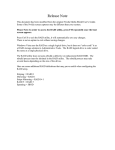

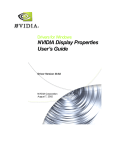
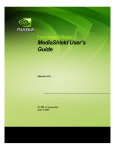


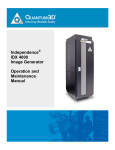
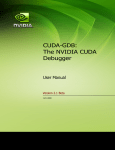
![Independence IDX 4000 IG User Manual [excerpts].](http://vs1.manualzilla.com/store/data/005651088_1-0e858df88d62387a8afea47c031c0cce-150x150.png)


